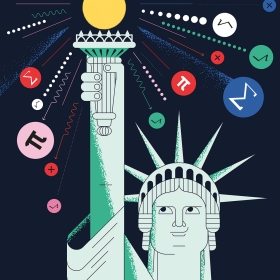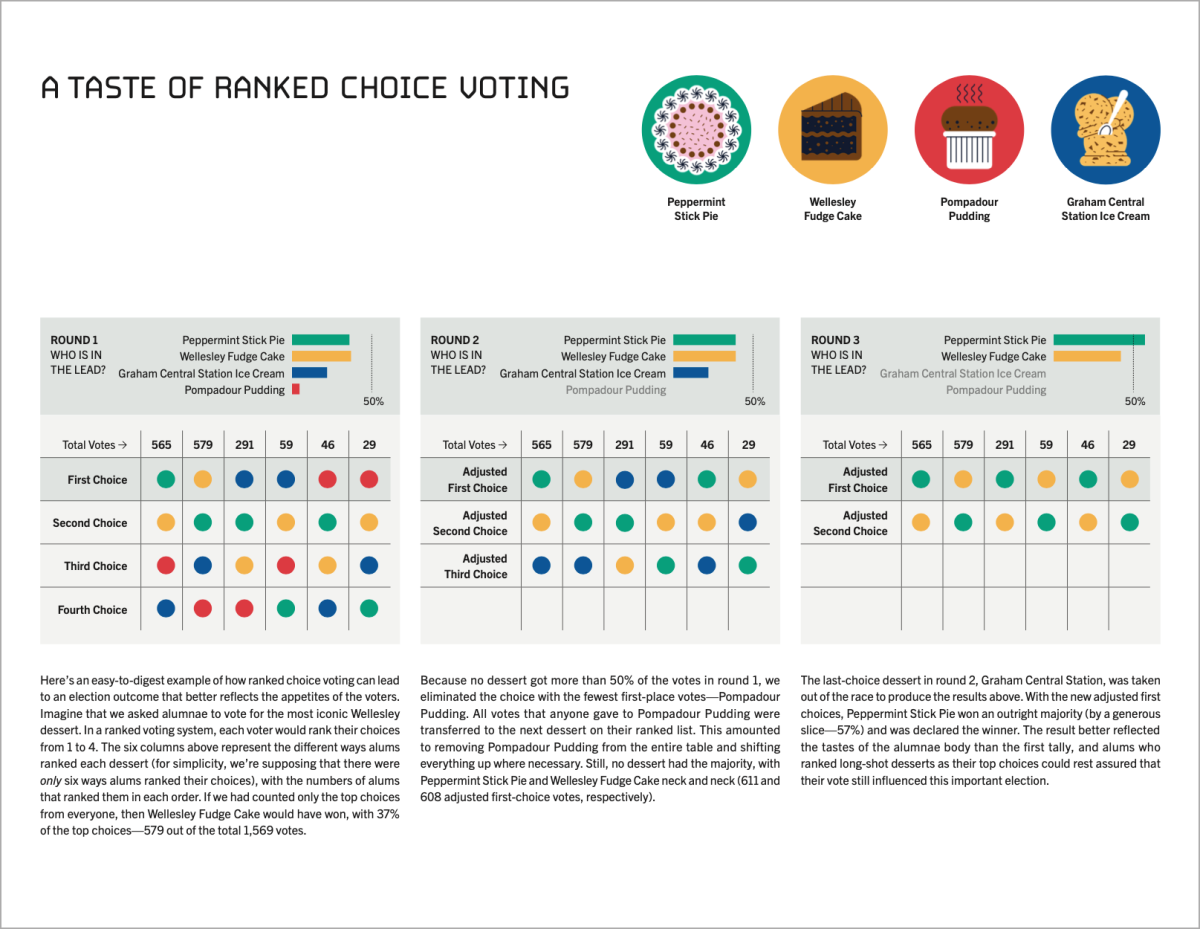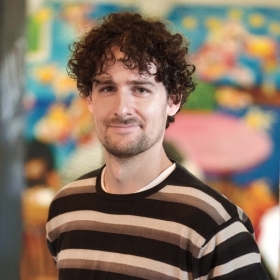A new institute at Wellesley supports education and research at the intersection of mathematics and politics.
A new institute at Wellesley co-founded by mathematics professors Ismar Volić and Stanley Chang supports education and research at the intersection of math and politics.

In 2020, more than half of Massachusetts voters rejected ranked choice voting, a system in which voters rank candidates in their order of preference rather than choosing just one.
Proponents say this is a fairer way to vote because it better reflects the majority’s will. Recently, New York City used ranked voting to choose its mayor. The practice is also popular in Canada and the U.K. Ismar Volić, professor of mathematics at Wellesley, says ranked voting could make the American political system more equitable by encouraging participation among underrepresented groups and electing candidates more in line with Americans’ values. In Massachusetts, he adds, it failed not because of a major groundswell against it, but because voters didn’t understand what it was.
“The way we vote in the U.S. is terrible,” Volić says. “Ranked choice is objectively and mathematically a better way of doing voting. In Massachusetts, it was really telling that there was no campaign against it. The resistance had to do with a lack of education.”
In recent years, Volić has also noticed an increase in mathematics being misused for political gain. For example, politicians on both sides of the aisle all too often cite numbers meant to elicit emotional responses—from the percentage of wealth held by a fraction of our population to the amount of federal funding Planned Parenthood receives. Some are accurate, while others aren’t.
“The inability to scrutinize and distinguish between bad and good math in political contexts is detrimental to effective citizenship,” Volić wrote in Education Week in 2020. “As long as we are fooled by unsubstantiated math or perplexed by its rigor, our democracy is in peril.”
But Volić has found a way to help. In 2019, he and Wellesley College Mathematics Department Chair Stanley Chang co-founded a new institute at Wellesley—the first of its kind in the U.S.—that’s dedicated to studying, researching, and communicating the role of math in politics and the quantitative aspects of democratic processes like voting and gerrymandering.
Volić is now director of the Institute for Mathematics and Democracy in addition to his duties as a professor. He and Chang see the institute as a nexus connecting academics and researchers, politicians, activists, and educators. More than 40 faculty from around the world are affiliated with the center, and some 20 students have already been involved with its research, attesting to the growing need for this kind of interdisciplinary organization, says Volić.
“We’re filling a gap with the center,” he says.

Click here to download a PDF of the graphic above on ranked voting
Real-World Problems
At the heart of the center’s mission is educating more people, and from a young age, about how critical math and data are to the democratic process. “Depending on the rule you use, you get different winners, you really do,” Chang says. “If you’re in power, you can leverage a win by having control of the voting mechanism.”
Mathematical tools can help right political wrongs and tackle social justice issues, Volić and Chang say. The current political climate powerfully illuminates how math can help.
“We’re living in a data-driven society,” says Volić. “Faced with more and more quantitative information coming at us, we have to be able to critically think about it, scrutinize it, understand where it came from, who’s giving it to us, and how it’s influencing opinions. If you want to be a participant in the political democratic process, you’re going to have to know how to grapple with this stuff.”
The idea for the institute had been a long time coming for Volić. He grew up in Bosnia in the 1980s, where he enjoyed studying math in school. His family watched the Yugoslav economy steadily decline, and then violence overtook their country. In the early 1990s, Volić came as a refugee to the U.S., where he completed high school, and then stayed for college and graduate school.
“The politics in the world and in Bosnia changed the course of my life,” Volić says. “Politics affected me in a real way. It was always present.”
As a postdoctoral student at the University of Virginia, Volić had a persistent feeling that he wanted to use math to address real-world problems. “I knew I couldn’t just close myself behind doors and prove theorems,” he says.
He taught a course on cryptography and privacy that he enjoyed because it revolved around math’s practical applications. Years later, he offered the class at Wellesley as a first-year seminar, and again reveled in teaching such a timely topic.
“I kept thinking, What else can I do that’s in this direction?” he says.
In 2019, Volić proposed offering a Mathematics and Politics course at Wellesley’s summer Pre-College Exploratory Workshop for high school girls, a pilot program the College ran before the pandemic. Administrators gave him the green light, and the class was a hit. Students were eager to learn about practical applications of math and how to use it for good. Volić took an interdisciplinary approach, weaving in lessons in history, economic policy, sociology, and math, among other subjects.
After his summer success, Volić developed the course for Wellesley students. It attracted students from across majors, many of whom claimed not to be a “math person.” Volić led discussions about gerrymandering and apportioning seats in the U.S. House of Representatives. “Two weeks in, students were so excited and engaged,” he says.
It’s this passion for math and politics that Volić and Chang also ultimately want to spark in young people. Chang was excited when Volić approached him with the idea for the institute and quickly got on board. He envisions it as a place that fosters the interest of students looking to pursue a nontraditional path in mathematics.
“The day and age have come and gone that calculus is the only thing you can learn and be mathematically literate,” Chang says. “My main hope is to be able to offer students more opportunities to learn different kinds of mathematics.”
When Volić talks about how the U.S. currently teaches kids math, he likes to tell the story of when his daughter’s fourth grade class voted on which of three movies they would watch as a reward for good behavior. His daughter tried to explain why ranked voting would best reflect what the majority of the class wanted, but she was sent back to her seat. Volić was disappointed, but he found hope in the fact that his 9-year-old understood the limitations in the movie voting process, the same one used to elect U.S. mayors, governors, and the president.
One problem is that math and politics is an interdisciplinary topic, which often can’t fit into set school curriculums. “The way our schools are structured doesn’t really lend itself to this type of learning,” Volić says. “It will take a while before [it] will appear in K–12 education. There will be glacial technetronic shifts.”
But that won’t stop him from starting to lay the foundation. Students need classroom experiences that teach how math applies to politics and to being a good citizen so that they can think critically about the political system. Mathematically superior ways to vote, like ranked voting, should be taught in schools, he says. That knowledge would empower students to push for a more equitable voting system.
“If we were educating in this direction from an early age, and we continue to do so, by the time people are old enough to vote, they would have this critical approach to political data and the math behind these processes,” Volić says.
Educational outreach is a major initiative of the institute, and Volić speaks regularly to community groups about math and democracy. For one popular talk, he tracks a ballot and the math behind it through the voting process, and he has written op-eds for publications and websites, including The Hill and WBUR’s Cognoscenti.

Math Activists
As part of the institute, Volić and Chang have encouraged students to conduct research in the area of math and politics. They started a fellows program for Wellesley students to work with them over the summer or during the school year on a variety of projects, and their findings have been illuminating.
One student analyzed political speeches over the last 60 years to see how many “math” words were used and whether Americans have become less adept at math. (The finding was: It depends.) Another has looked into how K–12 schools teach about voting methods and other concepts relating to math and politics. The research showed that while some individual teachers deliver creative lessons, the curriculum is not robust.
A typical path for students is to take Volić Math and Politics course, become a fellow, and then do summer research. Last year, 24 students applied for the four fellowships, open to juniors. Fellows are volunteers, but Volić and Chang hope to give credit for the work or pay students if the institute can get more funding. The center also hosts a conference each semester, often with global speakers.
On election night in 2020, the institute hosted a Zoom conference advertised as a session “to learn how to cut through the malarkey of voting and elections” that featured Volić, Chang, and their students talking about the electoral college and how voting works in the U.S. Nearly 100 participants tuned in.
In fall 2021, the Wellesley fellows, including Eliza Zizka ’22, discussed their research at a Zoom conference. Zizka grew up in Washington, D.C., interested in math and politics. Her project involved using category theory—an abstract field that unifies many different concepts in mathematics—to better understand how ranked voting works with the ultimate goal of making it fairer and more inclusive.
“I’ve always been really interested in abstract math and theory, but I didn’t know how to reconcile that with, How can I improve the world?” says Zizka, a math and geosciences major. “The fact that there is this bridge being built is kind of amazing.”
In a separate project, Anastasia Brooks ’23 tweaked mathematical indices that measure voting power to make them more realistic. She eliminated voting possibilities that were unlikely to occur, for example, Rep. Alexandria Ocasio-Cortez voting the same way on a bill as Rep. Marjorie Taylor Greene. The model could better predict votes, she says.
“Sometimes distribution of power isn’t as fair or obvious as one might think, and being able to better predict voting patterns gives us a more realistic account of who has the most power—and the least—in a system,” says Brooks.
The adjusted model could help political groups figure out which members have the most power and who needs to be swayed to their side. Campaign managers might also use it to decide which states to target with ads or candidate visits.
Brooks says that before working with the institute, she had resigned herself to pursuing math and political activism separately. “I had no idea I could combine them like this,” she says. “This is a very untapped field, and there’s a lot of work to do.”
Making Math More Visible
Volić and Chang are planning a conference for spring 2022 on the latest research in math and politics, and in October they’ll hold a session on math and politics as part of the American Mathematical Society meeting at UMass Amherst. Next steps include working to find external sources of funding for the institute.
“There’s an appetite for this kind of thing,” Chang says. “The pent-up desire is there, and it’s clear the institute can grow, and it should grow.”
Chang envisions himself, Volić, and students publishing research papers related to math and democracy and eventually serving as consultants for groups like school boards looking to make voting more equitable. One day, he’d like to see the institute replicated at other universities and even secondary schools across the globe.
Already in the last few years, Chang and Volić have seen small, encouraging changes in the U.S. related to democracy and math. More local governments have implemented ranked voting, while courts often call upon mathematicians to testify as expert witnesses in gerrymandering cases.
“Our work is becoming more and more visible,” Volić says. “For years, mathematicians have lived in these ivory towers and written abstract pages. But our democracy is in peril. I realized I had to do something, and I wasn’t alone. More and more people are feeling this urge to get involved.”
Deborah Lynn Blumberg ’00 is a Houston-based freelance writer who has written for publications including the Washington Post, the Wall Street Journal, and the Houston Chronicle.

